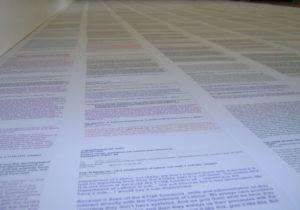 Non-fiction is normally represented as fact. It is assumed that the information in such books are accurate and, hopefully, well-researched. Unfortunately writers sometimes regard their perceptions as the only truth. Everybody has the right to write a book about her pet subject, believes, militancy, fanaticism, paranoia, etc. However, a writer who claims to have done scientific research when it is clear from the contents of the book that this is not the case not only does damage to the perceptions of her readers (if they are gullible enough to believe what they read) but also to her reputation as an authority in a particular field. The following are mistakes in collecting and using data for a book that can render your book worthless and your integrity questionable.
Non-fiction is normally represented as fact. It is assumed that the information in such books are accurate and, hopefully, well-researched. Unfortunately writers sometimes regard their perceptions as the only truth. Everybody has the right to write a book about her pet subject, believes, militancy, fanaticism, paranoia, etc. However, a writer who claims to have done scientific research when it is clear from the contents of the book that this is not the case not only does damage to the perceptions of her readers (if they are gullible enough to believe what they read) but also to her reputation as an authority in a particular field. The following are mistakes in collecting and using data for a book that can render your book worthless and your integrity questionable.
- Not satisfying your problem statement. The problem statement of a non-fiction book is often captured in the title or at least in the introduction. You must satisfy your problem statement if you claim to have done research. It serves no purpose collecting evidence, coming to conclusions and then not deriving any findings and recommendations from your conclusions.
- Using biased and superficial sources of information. You can never come to an objective conclusion if your target group is not a representative sample of the population. Using only sources that agree with your preconceived opinion is unscientific and dishonest. Using sources of information that cannot give you expert information is sometimes necessary. However, you cannot come to any valid conclusions if you don’t consult experts and well-researched documents as well.
- Bending the facts. The conclusions that you come to need to originate logically from the facts that you consider. You should not come to conclusions from only one or two sources of information. Your information needs to be corroborated by as many different reliable sources as possible. This is called triangulation.
- Being vague about your sources of information. Writing “many people to whom I spoke said that…” or “my research showed that…” creates the impression that you are either not writing the truth or you are embarrassed, for whatever reason, to acknowledge your sources of information, especially the people to whom you spoke. You need to give proper recognition to your sources so that you readers can see (and judge for themselves) if your arguments and conclusions are realistic and valid.
- Racism. The opinions of other people are not the only ones that can be labelled racist. Your opinion can also be racist even if you don’t think so. It does not help camouflaging your racist attitude behind innocent-sounding terminology. The writer of a book that I recently read wrote: “How dare a white person write a book on a black person?” My goodness.
- Perceptual errors. We all make perceptual errors. However, when you deliberately make such errors to achieve your personal (negative) objectives you are misleading you readers and destroying any credibility that your research might otherwise have had.
- Name dropping. It is necessary to recognise your sources of information, but it is unprofessional to just list names of important people without any indication of how they contributed to your book. You need to write what the “important person” said or wrote and then come to one or more conclusions on how what they said or wrote impacts on your problem statement.
- Going on an ego trip. Don’t write a book as if it is your memoirs if it is not. You research should focus on answering your problem statement or hypothesis, not about how clever or important you are. It is also not the right time to gain political points by complaining (actually boasting) about how much your suffered, how poor your parents were, how unfairly life or other people treated you. A “me, me, me” attitude only shows that you suffer from an inferiority complex. It does not contribute to the quality of your research.
- Repetition. Repeating the same argument over and over again does not make it true. Claiming on every tenth or so page that you did intensive research will not make your readers believe you if the contents of your book are clearly shallow, biased, vindictive, questionable, one-sided, subjective, negative, etc.
- Generalising. Don’t write statements like “Everybody feels that…” or “The only people saying so are…” unless you can substantiate your claims with viable, valid, authentic and corroborated facts.
In closing, once you have finished writing your book you should ask yourself what positive contribution the book will make and to whom. You should have the courage to admit that it is your opinion and not an objective and scientifically researched piece of work if you did not do proper research. If your motives were negative, for example selfish gain, jealousy, hate, sucking up to somebody or some (often political) organisation, etc. then you should not have written the book to begin with.
